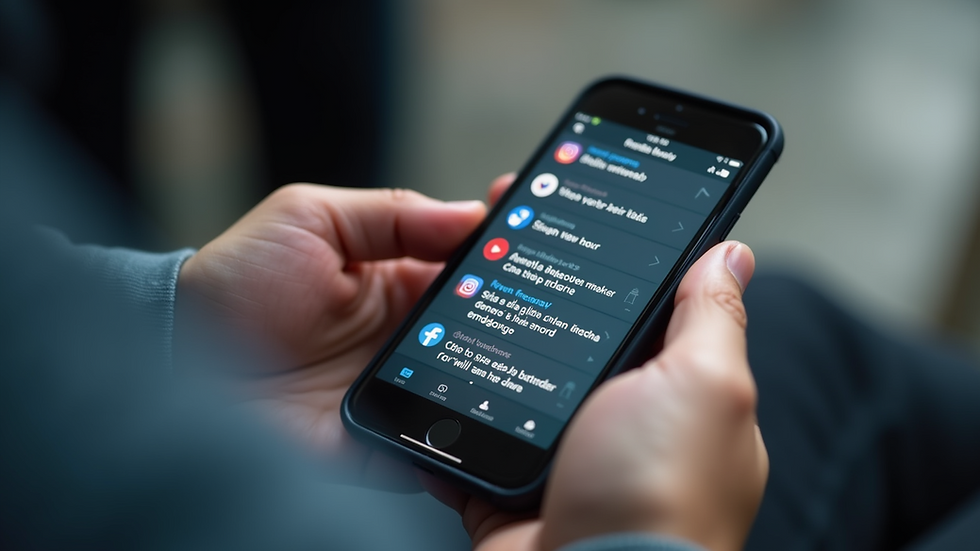The Social Network as a Crystal Ball for Technology's Alienation
- Lucas patterson
- Oct 7, 2025
- 4 min read
Engaging Reflection on Digital Life

When "The Social Network" emerged in 2010, it was not just a narrative about Facebook's founding. It offered a sharp examination of the positive and negative effects of our digital lives. Directed by David Fincher and scripted by Aaron Sorkin, the film accurately predicts the complexities of technology and its impact on human relationships. As we navigate our tech-driven world today, it becomes clear that this film serves as a warning, showing us how technology can lead to isolation even as it connects us.
In this post, we will unpack how "The Social Network" anticipated technology-driven alienation, focusing on themes of loneliness, the commercialization of relationships, and the contradictory nature of being connected.
The Rise of Digital Isolation
In the film, we witness Mark Zuckerberg, played by Jesse Eisenberg, as a brilliant yet socially awkward individual who builds a platform designed to connect people. However, as the narrative unfolds, it becomes clear that Facebook fosters isolation among its users.
Today, research reveals that about 60% of social media users report feeling lonely despite regular online interactions. This contradiction is at the heart of digital isolation, where technology intended to foster relationships often creates barriers.
The film brilliantly encapsulates this shift by illustrating how our reliance on screens and apps can hinder genuine human connections. Instead of bonding over shared experiences, the focus shifts to likes, shares, and comments, leaving many feeling disconnected and unfulfilled.
The Commodification of Relationships
Another powerful theme in "The Social Network" is how technology changes our view of relationships. Zuckerberg’s initial drive to create Facebook stems from a quest for validation, resulting in friendships represented merely as likes and shares on a screen.
This trend is evident today, where many people prioritize the number of followers over the depth of their connections. A study by the Pew Research Center found that 47% of teens feel pressured to post content that gets lots of likes. This pressure diminishes the authenticity of relationships, creating an environment where self-esteem is often tied to online metrics.
Zuckerberg's journey serves as a cautionary tale about prioritizing quantity over quality in our relationships. When we begin to see friendships as status updates rather than real connections, we lose the substance behind them.

The Paradox of Connectivity
The film introduces the paradox of connectivity: even as technology makes it easy to communicate, forming real connections remains challenging. Zuckerberg's relationships deteriorate as his online empire grows, reflecting a common struggle in today's hyper-connected society.
Numerous surveys indicate that more than 70% of people feel an emotional disconnect despite being constantly connected through devices. This paradox highlights how essential communication skills like empathy and openness can fade amid a barrage of notifications and messages.
True connections require more than online interactions; they demand presence—something the film starkly reminds us of. It emphasizes the necessity of face-to-face conversations and genuine engagement in a world obsessed with technology.
The Impact on Mental Health
The film prompts us to consider how technology affects our mental health. The pursuit of validation through social media can lead to heightened anxiety, depression, and feelings of inadequacy.
Current statistics illustrate this growing concern. For instance, a study from the University of Pennsylvania found that limiting social media use to 30 minutes a day significantly reduced feelings of loneliness and depression. These findings reinforce the film's message regarding the potentially harmful repercussions of excessive social media engagement.
"The Social Network" underscores the importance of mental health in our digital era, urging us to reflect on our technology usage and strive for a healthy balance between online and offline life.

Looking Ahead: Technology and Human Connection
As we consider the future of technology, "The Social Network" prompts us to think critically about how it will shape our relationships. The challenge lies in harnessing technology for positive outcomes while minimizing its isolating effects.
Actions we can take include promoting digital literacy and encouraging user awareness about the psychological impacts of social media. Creating environments that foster genuine interactions, both digitally and in person, can lead to healthier relationships.
The film serves as a call to prioritize authentic connections in a tech-dominated landscape. It encourages individuals to seek depth in relationships and to be mindful of how they engage with the digital world.
Final Thoughts
"The Social Network" transcends its plot about Facebook; it is a profound look at our shifting relationships in the digital age. By examining isolation, the commercialization of friendship, and the complicated nature of connectivity, it serves as an insightful reminder of technology's potential impacts.
As we navigate further into the tech-driven future, reflecting on the lessons from the film becomes crucial. By valuing authentic connections and nurturing a healthy relationship with technology, we can aspire to a future where our digital lives enhance rather than detract from our human experiences.
Ultimately, let us strive to foster meaningful interactions filled with empathy and understanding. The true power of technology lies in its ability to bring us together in ways that are substantial and impactful.
© 2025 The Lucas Tribune By K.L.P Entertainment
© 2025 Kennedy Lucas Publishings LLC
© 2025 Kennedy Lucas & Associates
© 2025 The Office Of Kennedy Lucas Patterson
© 2025 The Lucas Tech Company



Comments